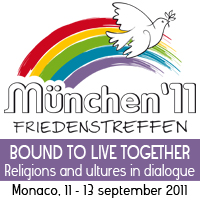
Presidente de la Alianza de todas las minorías de Pakistán
|
Good afternoon/evening distinguished guests, ladies and gentleman. I would like
to take this opportunity again to thank the community of Saint’Egidio and the
Archdiocese of Munich most sincerely for giving me this opportunity and privilege
to speak with you on a topic that I am passionate about and engaged with on the
ground among Minorities in Pakistan in our ongoing struggle for Religious
Freedom.
My talk is titled:
RELIGIOUS FREEDOM BRINGS PEACE: THE STRATEGY OF
RELIGION IN THE ACTUALISATION OF WORLD PEACE
99.637% of the Worlds population are religious believers, therefore more than
ever there is a growing need for not only dialogue that will address today’s
context but for relationships with other inter-religious communities. The potential
role of religion in conflict, and the growing place of religion in public life, present
urgent challenges that require a greater understanding and co-operation among
In the context of Pakistan the latest annual report 2011, from the U.S.
Commission on International Religious Freedom, highlighted Pakistan along with
13 other countries, being of particular concern with severe religious persecution.
An analysis of the situation in Pakistan for minorities made by the All Pakistan
Minorities Alliance, (founded by my brother the late Shahbaz Bhatti, Federal
Minister for Minorities, of which I am now the Chairman), identifies the following
reasons that may be responsible for the present situation of Minorities in
Pakistan.
1. Unstable Government
2. Discriminatory laws
3. Religious extremism, fanaticism and terrorism
2
4. Corruption
5. Poverty
6. Illiteracy
Since Pakistan’s creation in 1947 there are violations of Minorities rights and they
have been progressively increasing making Pakistan one of the most intolerant
societies in the world today.
The instability of the Pakistan Government is complex. For example, with 63
years of independence 34 years were ruled by the Army and 29 years with a
Civilian Government.
The two wars with India over the disputed region of Kashmir have caused further
development of extremism and terrorism. The previous fall out of the Russian
invasion in Afghanistan and the presence of over 3 million Afghan refugees in
Pakistan has further exacerbated the situation.
Recently, being an ally to the Western world in its fight against terrorism and
extremism, Pakistan is confronted with internal and cross border terrorism,
sectarian violence, religious extremism, fanaticism, intolerance, and
discrimination. Pakistan has lost over 35,000 innocent citizens and over 3,500
law enforcing personnel. This has further aggravated religious intolerance
against religious minorities creating hate crimes towards Christian communities
who are constantly being victimized by Islamic extremists. Daily Pakistan
Minorities are confronted with violations of religious freedom. Blasphemy law is
routinely abused, resulting in lengthy detentions, physical violence, forceful
conversions and sometimes death.
3
(PROPOSITION)
It is within this context, I propose a way forward and that is religious freedom can
be the solution in the actualisation of world peace. It is with an attitude of unity,
we need to build a road of religious education, to create an awareness that
inherent in every faith tradition are woven beliefs for future generations to see
others as members of the one human family, whereby no one is excluded, thus
bringing about peace and an end to violence in the world.
Religious traditions are deeply ambiguous and complex phenomena, giving
expression to the best as well as the worst of human nature.1 This is certainly
true of the Christian tradition. The Church has been guilty of the most awful
crimes against humanity; that has generated a religion that betrayed God, but it
has also done much to foster belief in the equality of every individual before God
and to encourage powerful works of charity and justice making. In many parts of
the world today, the Christian Church is one of the most influential forces of
human rights struggle due to its closeness to ordinary people and to its extensive
international links.
Positive Features of Religion as a Strategy
Contributing to Human Rights and World Peace
There are few areas of life that human rights thinking have not touched,
impacting international law, global ethical consciousness and theological
discussion. It has virtue of a universal language in terms of pursuing justice and
peace.2 Positively, as a religious community we can validate, enrich, strengthen
1 Cf. D Tutu, “Religion and Human Rights,” in Hans Kung (ed.), Yes to Global Ethic
(London:SCM, 1996), 164-174.
2 Rights has become a favourite idiom for articulating fundamental social values and preferred
strategy for clarifying and resolving areas of conflict. There has been a vast discourse over a
period of 50 years and there are few areas of contemporary life that human rights thinking has not
touched standing as a recognised standard of accountability for actions of governments and
states.
4
and offer corrective action or advise with respect for human rights. The greatest
safeguard for human rights lies in having human rights convictions thoroughly
integrated in the moral psychology of a people and connected to its deepest
convictions about the meaning of human life. Religion is by far better equipped to
do this than any other structures of the secular state. Christian faith in particular
aims to write God’s law on the human heart and to nurture the values and
qualities of character necessary for human rights to flourish, Hebrews 10: 16; 2
Cor 3:6; cf Jer 31:33; Prov 3:3; 7:3.
The biblical creation narratives offer the most powerful motivation for observing
human rights and freedoms. Grounding human rights in the divine image
constitutes them as sacred entitlements. Each and every human being bares the
image of God therefore any neglect and mistreatment of human beings is a sin
against the Creator; their abuse is sacrilege, the desecration of something most
holy, the violation of God in person. The observance of human rights brings glory
and honour to God, for God imparts divine glory to humankind with the imago
Dei, Psalm 8:4-5 3
As image bearers we should not kill one another (Gen 9:6; Exodus 20:13).4
God’s words to Cain, “What have you done!” resonate with the inherent value of
every human life (Gen 4:10-11). Because humans live in bodies, humans must
also have the right to remain whole,5 not to be abused maimed or tortured
starved or molested. The rights to life includes the right to the means of life as
3 cf Gen 31:1, 45:13; Ex 17:7, 33:18; 1 Kings 8:11; Isa 6:3, 10:3, 22:24.
4 The Mekilta- a rabbinic commentary on Exodus-suggests that the ten commandments were
engraved on parallel tablets of stone, with each commandment being related to its opposite
number. The first commandment, about the absolute sovereignty of God, is paralleled by the
prohibition of murder. This arrangement the rabbis teach, serves to show that to kill a person is to
diminish the likeness of God, indeed to diminish the reality of God’s self. As in Polish, “Judaism
and Human Rights”: 41.
5 Right to security of person, right to means of life.
5
well, food shelter clothing and health. Humans are responsible for the welfare of
others and obligation primarily that we have to God. “Where is your brother
Abel?” God asks Cain (Gen 4:9). Such responsibility cannot be evaded; it is an
element to our humanness. Nor can such responsibility be discharged simply by
non-interference. Being my brother’s keeper includes practical concern for
positive action on behalf of other image bearers. (Gen 4:9-10, Luke 10:25-37).
Since every individual bares the image of God in equal measure and because
every human has a common ancestor, there is a basic equality beneath all
human distinctions of race, gender, class, rank or religion. All people are
cosmically children of the same father (Mal 3:10), common descendants of
Adam, hence biologically kin to each other. Interfaith dialogue, creates an
awareness of the deepest meaning of what our scriptures say to us and opens
up and speaks anew among people of other faiths.
As Muslims enter dialogue, they recognise the Qur’anic texts concerning diversity
and God’s purpose which say: "O people: we created you from a single [pair] of
male and female, and made you into nations and tribes, that you may know each
other (49:13) and "We sent you solely as a mercy for all creatures" (21:07).
Plurality is inscribed in God’s design: "To each among you have we prescribed a
law and open way. If God has so willed, He would have made you a single
people but [His plan] is to test you in what He has given you: so excel each other
in good deeds; it is He that will show you the truth of the matters in which you
dispute (5:48). Muslims are called to seek justice through their dialogue activities.
The Qur’an teaches "Give just measures and weight; do not deprive others of
their due" (7:85) and "O you who believe I Stand out firmly for God as witnesses
for fair dealing, and let not the hatred of others turn you away from justice, be
just: that is nearer to piety" (5:8).
6
RELIGIOUS FREEDOM BRINGS PEACE
Contrary to what is often feared, religious freedom does not create social
instability but actually leads to increased public order. Societies are more likely to
flourish when its citizens have the freedom to voice their deepest beliefs and
highest ideals. During the past few years, a number of studies show the benefits
of religious freedom to civil society all over the world. One such study is a book
titled “The Price of Freedom Denied” (published by Cambridge University Press
in 2011), by authors, Brian J. Grim and Roger Finke. Their research of data of
over 200 countries and case studies of six countries, shows that by ensuring
religious freedom for all promotes social stability and reduces violent religious
persecution and conflict. Because freedom of religion is part of “a much larger
bundle of civil liberties,” the “denial of religious freedoms is inevitably intertwined
with the denial of other freedoms.” The international study found a correlation
between religious freedom and “fewer incidents of armed conflict, better health
outcomes, higher levels of earned income, prolonged democracy, and better
educational opportunities for women.” Their study also found a positive
correlation between freedom of religion and a variety of other social benefits such
as gender empowerment, lower poverty, overall “liveability” or quality of life,
lower inflation, lower income inequality, and higher earned income for both
women and men.
In closing:
Let us stand in solidarity uniting for the cause of religious freedom building the
road of religious education, thus bringing about peace and an end to violence in
the world.
Thank you |

